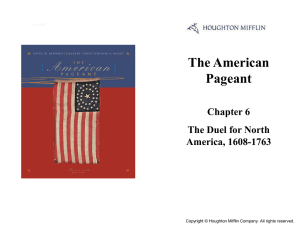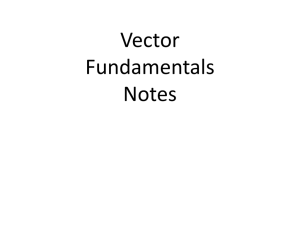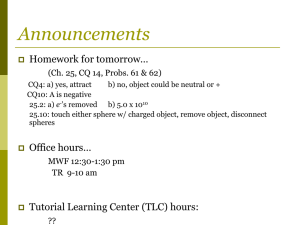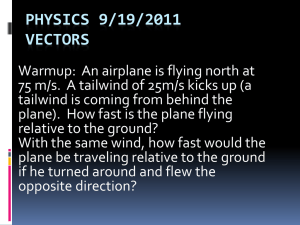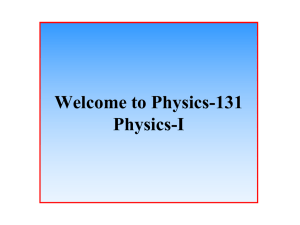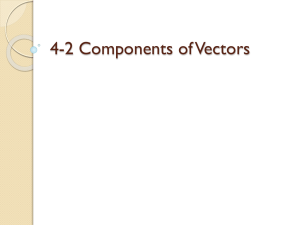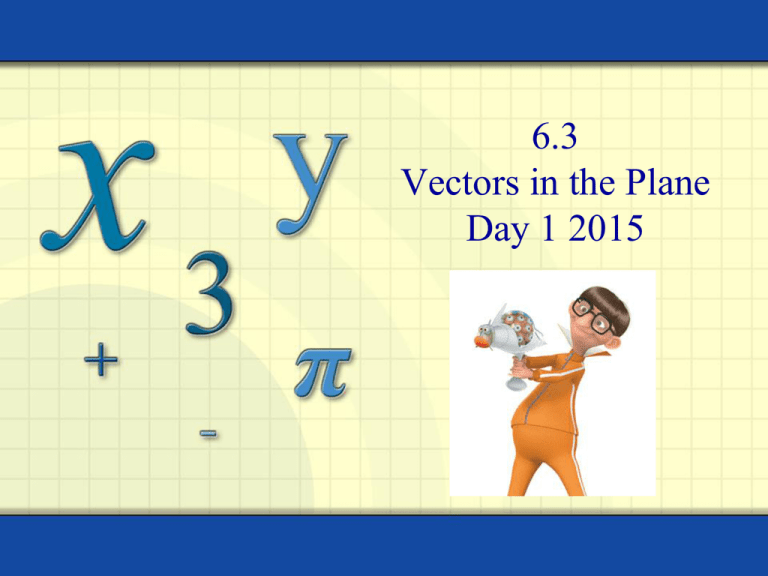
6.3
Vectors in the Plane
Day 1 2015
A vector is a quantity with both a magnitude and a
direction.
A ball flies through the air at a certain speed and in a
particular direction. The speed and direction are the
velocity of the ball. The velocity is a vector quantity
since it has both a magnitude and a direction.
Vectors are used to represent velocity, force, tension,
and many other quantities.
Copyright © by Houghton Mifflin Company, Inc. All rights reserved.
2
A quantity with magnitude and direction is represented by
a directed line segment PQ with initial point P and
terminal point Q.
P
Q
The vector v = PQ is the set of all directed line segments
of length ||PQ|| which are parallel to PQ.
Two vectors, u and v, are equal if the line segments
representing them are parallel and have the same length
or magnitude.
v
u
Copyright © by Houghton Mifflin Company, Inc. All rights reserved.
3
Vector Representation by Directed Line Segments
Let u be represented by the directed line segment from
P = (0,0) to Q = (3,2), and let v be represented by the directed
line segment from R = (1,2) to S = (4,4). Show that u = v.
S
4
Using the distance formula, show
that u and v have the same length.
Show that their slopes are equal.
v
3
Q
R
2
u
3 02 2 02
13
v
4 12 4 22
13
u
1
Slopes of u and v are both
P
1
2
3
4
2
3
Scalar multiplication is the product of a scalar, or
real number, times a vector.
For example, the scalar 3 times v results in the vector 3v,
three times as long and in the same direction as v.
v
3v
The product of -
and v gives a vector half as long
as and in the opposite direction to v.
v
-
v
Copyright © by Houghton Mifflin Company, Inc. All rights reserved.
5
Vector Addition
To add vectors u and v:
v
u
1. Place the initial point of u at the terminal point of v.
2. Draw the vector with the same initial point as v and
the same terminal point as u.
v
u
u
v
v+u
Copyright © by Houghton Mifflin Company, Inc. All rights reserved.
6
Vector Subtraction as adding the opposite.
v
To subtract vectors u and v: u v
Add the opposite of v to u: u +( v)
u
1. Place the initial point of v at the terminal point of u.
2. Draw the vector u v from the initial point of u to the
terminal point of v.
u
u
uv
-v
Copyright © by Houghton Mifflin Company, Inc. All rights reserved.
-v
7
Vector Subtraction
v
u
To subtract vectors u and v:
1. Place the initial point of v at the initial point of u.
2. Draw the vector u v from the terminal point of v
to the terminal point of u.
v
v
uv
u
Copyright © by Houghton Mifflin Company, Inc. All rights reserved.
u
8
A vector with initial point (0, 0) is in standard position and is
represented uniquely by its terminal point (v1, v2). This is the
component form of a vector v, written as v1 , v2 .
y
(v1, v2)
x
If v is a vector with initial point P = (p1 , p2) and terminal point
Q = (q1 , q2), then
1. The component form of v is
v = q1 p1, q2 p2
2. The magnitude (or length) of v is
y
P (p1, p2) Q (q1, q2)
x
||v|| = ( q 1 p 1 ) 2 ( q 2 p 2 ) 2
Copyright © by Houghton Mifflin Company, Inc. All rights reserved.
9
Remember that to write a vector in
component form: v = q1 p1, q2 p2
Use terminal point – initial point.
Copyright © by Houghton Mifflin Company, Inc. All rights reserved.
10
Example:
Find the component form and magnitude of the vector v with
initial point P = (3, 2) and terminal point Q = (1, 1).
Component form:
v 4,3
The magnitude of v is
||v|| =
( 4 ) 2 ( 3 ) 2 = 2 5 = 5.
Copyright © by Houghton Mifflin Company, Inc. All rights reserved.
11
You Try: Find the component form and length of the vector v
that has initial point (4,-7) and terminal point (-1,5)
Let P = (4, -7) = (p1, p2) and Q = (-1, 5) = (q1, q2).
Then, the components of v = are given by
v1 ,v2
Thus, v = 5, 12
The length of v is
v (5) 12 169 13
2
2
Two vectors u = u1, u2 and v = v1, v2 are equal if and only if
u1 = v1 and u2 = v2 .
Example: If u = PQ, v = RS, and w = TU with P = (1, 2),
Q = (4, 3), R = (1, 1), S = (3, 2), T = (-1, -2), and U = (1, -1),
determine which of u, v, and w are equal. (solution follows.)
Calculate the component form for each vector:
u = 4 1, 3 2 = 3, 1
v = 3 1, 2 1 = 2, 1
w = 1 (-1), 1 (-2) = 2, 1
Therefore v = w but v =/ u and w =/ u.
Copyright © by Houghton Mifflin Company, Inc. All rights reserved.
13
Operations on Vectors in the Coordinate Plane
Let u = x1 , y1 , v = x2 , y2 , and let c be a scalar.
1. Scalar multiplication cu = cx1 , cy1
2. Addition
3. Subtraction
u + v = x1 x2 , y1 y2
u v = x1 x2 , y1 y2
Copyright © by Houghton Mifflin Company, Inc. All rights reserved.
14
Examples: Given vectors u = 4, 2 and v = 2,5
Find -2u, u+v, and u-v
Try these on
y your own.
-2u = 2 4, 2 8, 4
(4, 2)
u
(-8, -4)
u + v = 4, 2 + 2,5 = 6, 7
y
(2, 5)
v
-2u
u v = 4, 2 2,5 = 2, 3
y
(2, 5)
(6, 7)
v
(4, 2)
u
x
x
Copyright © by Houghton Mifflin Company, Inc. All rights reserved.
(4, 2)
u
uv
(2, -3)
x
15
Vector Operations
Ex. Let v = 2,5 and w = 3,4 . Find the following vectors.
a. 2v
b. w – v
w v 5, 1
2v 4,10
10
4
8
2v
6
3
w
4
2
-v
v
2
-4
-2
1
2
-2
-1
w-v
1
2
3
4
5
A unit vector is a vector whose magnitude = 1. In many vector
applications it is useful to find a unit vector that has the same
direction as a given vector v. To do this, divide v by its length to
obtain:
v 1
v
u = unit vector
v v
Ex: Find a unit vector in the direction of v =
v
v
2,5
2 5
2
2
1
2,5
29
2,5
2 5
,
29 29
You try:
a) Find a unit vector in the direction of
3, 4
3 4
,
5 5
b) Find the magnitude of the unit vector you just found.
1
Copyright © by Houghton Mifflin Company, Inc. All rights reserved.
18
Homework 6.3 Day 1
• Pg.417 1-35 odd
Copyright © by Houghton Mifflin Company, Inc. All rights reserved.
19
Digital Lesson
Vectors in the Plane
Day 2 2015
Standard unit vectors
The unit vectors i 1, 0 and j 0,1 are called
the standard unit vectors. i represents one unit of
horizontal movement and j represents one unit of
vertical movement. Any vector can be represented
by what is called a linear combination of unit vectors.
Example: Vector v 2, 6
can be
represented as a linear combination of
unit vectors by rewriting it as v= 2i-6j.
Copyright © by Houghton Mifflin Company, Inc. All rights reserved.
22
Writing a Linear Combination of Unit Vectors
Let u be the vector with initial point (2, -5) and terminal point
(-1, 3). Write u as a linear combination of the standard unit
vectors of i and j.
6
Solution
(-1, 3)
10
4
u 3,8
2
-2
-2
u 2
4
-4
(2, -5)
8
6
3i 8 j
4
Graphically,
it looks like…
8j
2
-3i
-6
-4
-8
-2
2
-2
Writing a Linear Combination of Unit Vectors
Let u be the vector with initial point (1, -7) and terminal point
(-1, 2).Write u as a linear combination of the standard unit
vectors i and j.
Begin by writing the component form of the vector u.
u 2,9
u 2i 9 j
Example:
Find the vector v with the given magnitude
and the same direction as u.
v 3,
u 4, 4
Copyright © by Houghton Mifflin Company, Inc. All rights reserved.
3 2 3 2
v
,
2
2
25
You try:
Find the vector v with the given magnitude
and the same direction as u.
v 10,
u 2i 3 j
Copyright © by Houghton Mifflin Company, Inc. All rights reserved.
v
20 13
i 30 13
13
13
j
26
Vector Operations
Let u = -3i + 8j and let v = 2i - j. Find 2u - 3v.
2u - 3v = 2(-3i + 8j) - 3(2i - j)
= -6i + 16j - 6i + 3j
= -12i + 19 j
Finding Direction Angles
The direction angle of a vector v is the angle formed by
the positive half of the x-axis and the ray along which v lies.
y
y
θ
x
v
θ
x
If v = x, y , then tan =
If v = 3, 4 ,
then tan =
v
y
.
x
and = 53.13.
Copyright © by Houghton Mifflin Company, Inc. All rights reserved.
y
(x, y)
v
x
y
x
29
• Find the magnitude and direction angle of
the vector:
u 3i 3 j
Copyright © by Houghton Mifflin Company, Inc. All rights reserved.
u 3 2, 45
30
• Find the magnitude and direction angle of
the vector:
v 3i 4 j
Copyright © by Houghton Mifflin Company, Inc. All rights reserved.
v 5, 306.87
31
• Find the direction angle of the vector:
v 3i 4 j
Copyright © by Houghton Mifflin Company, Inc. All rights reserved.
v 5,
126.87
32
• Find the direction angle of the vector:
v 3i 4 j
Copyright © by Houghton Mifflin Company, Inc. All rights reserved.
v 5,
233.13
33
Writing Vectors using Direction Angles
If u is a unit vector such that is the angle (measured
counter-clockwise) from the positive x-axis to u, the terminal
point of u lies on the unit circle and you have:
u x, y cos ,sin cos i sin
j
To indicate a length other than 1, multiply the unit
vector by a magnitude. v v cos ,sin
The vector v 5 cos30,sin 30 has a magnitude
of 5 in the direction of 30 degrees.
Copyright © by Houghton Mifflin Company, Inc. All rights reserved.
34
• Find the component form of v given its
magnitude and the angle it makes with the
positive x-axis:
v 3 and v is in the direction of 3i+4j
v 3 cos53.13,sin 53.13
Copyright © by Houghton Mifflin Company, Inc. All rights reserved.
35
Homework 6.3 Day 2
• Pg.418 37-61 odd
Copyright © by Houghton Mifflin Company, Inc. All rights reserved.
36
• Find the direction angle and write the
component form using it:
v 4 and v is in the direction of -5i-2j
v 4 cos 201.8,sin 201.8
Copyright © by Houghton Mifflin Company, Inc. All rights reserved.
37
Vectors in the Plane
Day 3 2015
(use class notes handout)
HWQ
Add vectors u and v.
u= 2i-j v = -i+j
Explain how you found the sum.
u+v = 1i+0j = I
Add two vectors by adding the horizontal components (x) ,
and the vertical (y) components.
The result is a new vector called the resultant of u and v.
Copyright © by Houghton Mifflin Company, Inc. All rights reserved.
39
Resultant Vectors (sum of vectors)
• The sum of two or more vectors is called the
resultant of the vectors.
• Find the resultant of u and v.
u 3,
u 30
v 4,
v 60
resultant vector: r = 4.6, 4.96
E. Find the magnitude of the vertical and horizontal components of this distance vector.
1.A ship leaving port sails for 75 miles in a bearing N 55
Applications
A ship leaving port sails for 75 miles at a bearing N
55 E. Find the magnitude of the vertical and
horizontal components of this distance vector.
Distance Vector: 75 cos35,sin 35
75cos35 61.44 miles
Copyright © by Houghton Mifflin Company, Inc. All rights reserved.
75sin 35 43.02 miles
41
1.Find
of vertical
the vector
represents
the velocity
of distance
a plane descending
at a speed of 100 mph. @ an angle o
E. Findthe
thecomponent
magnitudeform
of the
andthat
horizontal
components
of this
vector.
1.A ship leaving port sails for 75 miles in a bearing N 55
Applications
Find the component form of the vector that
represents the velocity of a plane
descending at a speed of 100 mph.
@ an angle 30 degrees below horizontal.
v 100 cos 210,sin 210
3 1
v 100
,
2
2
Copyright © by Houghton Mifflin Company, Inc. All rights reserved.
v 50 3, 50
v
50 3
2
50 100
2
42
E. Find the magnitude of the vertical and horizontal components of this distance vector.
1.A ship leaving port sails for 75 miles in a bearing N 55
Applications
An airplane is traveling at a speed of 500 mph. with an air
bearing of 330 degrees, at a fixed altitude, with negligible wind
velocity.
As the airplane reaches a certain point, it encounters a wind
blowing with a velocity of 70 mph. in the direction
N 45E.
Find :
Resultant Speed
a. The resultant speed.
v 522.5 mph
b. The direction of the airplane.
Direction of the Plane
112.6
True Direction = 337.4
Copyright © by Houghton Mifflin Company, Inc. All rights reserved.
43
E. Find the magnitude of the vertical and horizontal components of this distance vector.
1.A ship leaving port sails for 75 miles in a bearing N 55
Applications
A piling for a high-rise building is pushed by two bulldozers at
exactly the same time. One bulldozer exerts a force of 1550
pounds in a westerly direction. The other bulldozer pushes
the piling with a force of 3050 pounds in a northerly direction.
What is the magnitude of the resultant force upon the piling?
r
1550
2
3050 3421.25
2
What is the direction of the resulting force upon the piling?
3050
tan
116.94
1550
1
Copyright © by Houghton Mifflin Company, Inc. All rights reserved.
44
E. Find the magnitude of the vertical and horizontal components of this distance vector.
1.A ship leaving port sails for 75 miles in a bearing N 55
You Try
The Shanghai World Finance Center building in Shanghai,
China, is 1508 feet tall. Suppose that a piling for building is
pushed by two bulldozers at exactly the same time. One
bulldozer exerts a force of 900 pounds in an easterly
direction. The other bulldozer pushes the piling with a force
of 2150 pounds in a northerly direction.
What is the magnitude of the resultant force upon the
piling?
2
2
r 900 2150 2330.77
What is the direction of the resulting force upon the piling?
2150
tan
67.29
900
1
Copyright © by Houghton Mifflin Company, Inc. All rights reserved.
45
Homework 6.3 Day 3
• Pg.418 63-65 odd, 69-75odd ,81,82
Copyright © by Houghton Mifflin Company, Inc. All rights reserved.
46


